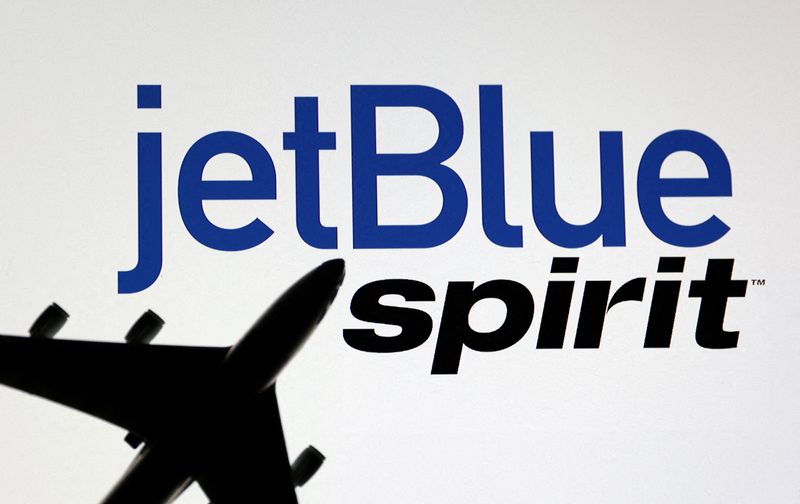JetBlue wins Spirit takeover battle with $3.8 billion deal
2022.07.28 23:54

FILE PHOTO: Airplane model is placed on displayed Spirit Airlines and jetBlue Airways logos in this illustration taken, June 21, 2022. REUTERS/Dado Ruvic/Illustrations/File Photo
By Rajesh Kumar Singh and Abhijith Ganapavaram
(Reuters) -JetBlue Airways Corp on Thursday prevailed in a months’ long bidding war for Spirit Airlines (NYSE:SAVE) Inc after the ultra-low-cost carrier accepted its $3.8 billion buyout deal.
The New York-based airline clinched the deal a day after Spirit terminated its $2.7 billion merger deal with Frontier Group Holdings.
JetBlue’s shares were down 2.4%, while Spirit’s shares were up 5.4% in afternoon trade.
With a combined market share of 9%, the acquisition would create the fifth-largest U.S. airline. JetBlue expects the deal to result in $600 million-$700 million in net annual synergies and accelerate its plan to operate more than 1,700 daily flights to more than 125 destinations.
But the fate of the deal, which is expected to close no later than the first half of 2024, hinges on securing regulatory approvals. That was a reason why Spirit repeatedly spurned JetBlue’s offer.
Robin Hayes, JetBlue CEO, sounded confident of clearing regulatory hurdles and closing the transaction.
“We believe a more national JetBlue would have a very significant impact on lowering fares across the board,” he told Reuters in an interview. “In addition, we’ve offered an unprecedented set of divestiture commitments.”
The U.S. Justice Department has filed an antitrust lawsuit against American Airlines (NASDAQ:AAL) Group Inc and JetBlue over their alliance at airports in Boston and New York, arguing it would lead to higher fares.
JetBlue has declined to abandon the partnership, but has offered to divest Spirit’s holdings at the Northeastern airports.
The company also faces the challenge of smoothing Spirit’s ruffled feathers after repeatedly questioning the integrity of its board in the run-up to the deal. Hayes, however, expressed confidence that the two sides would be able to work together.
“This is one of the toughest industries that you can compete in,” he said. “So, if we’re going to get upset here because of what a couple of people have said during a process, then you know we shouldn’t be in these jobs.”
Spirit CEO Ted Christie said JetBlue’s offer serves the “best interests” of his company’s shareholders and that his team would focus on closing the deal.
JetBlue’s offer price of at least $33.50 per share represents a premium of nearly 38% to the last closing price of Spirit shares. Including a “ticking fee,” or small monthly payments to Spirit shareholders from January next year until the deal is completed, the offer can increase to $34.15 per share.
Spirit signed a cash-and-stock deal with rival Frontier in February to form a new no-frills airline and compete against big national carriers. In April, JetBlue jumped into the fray with an all-cash offer, sparking a bidding war with Frontier.
Despite JetBlue’s superior terms, Spirit pushed for a merger with Bill Franke backed-Frontier, saying U.S. regulators would block a deal with JetBlue.
But it could not muster enough investor support for the Frontier deal and was forced to delay a shareholder vote on the proposed acquisition four times.








